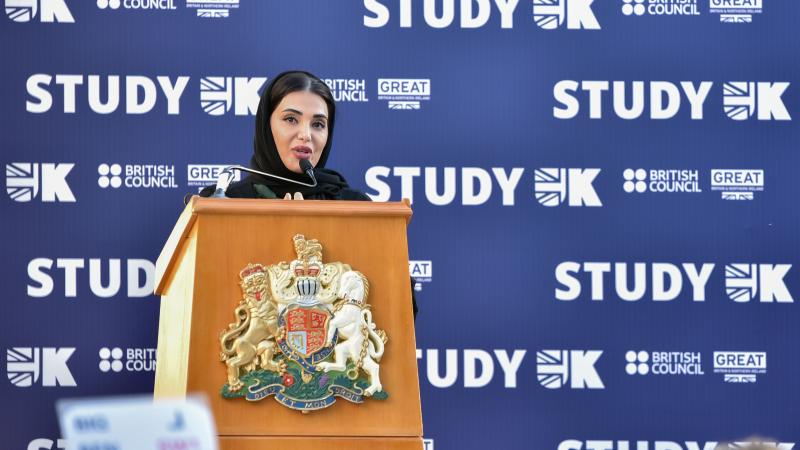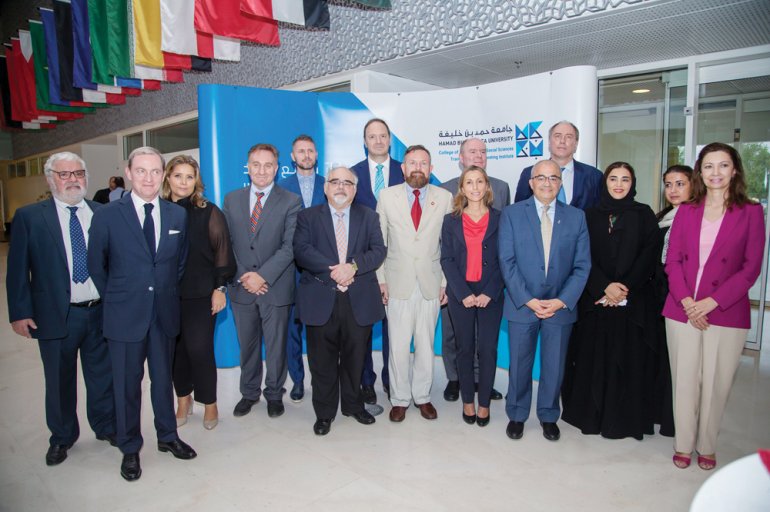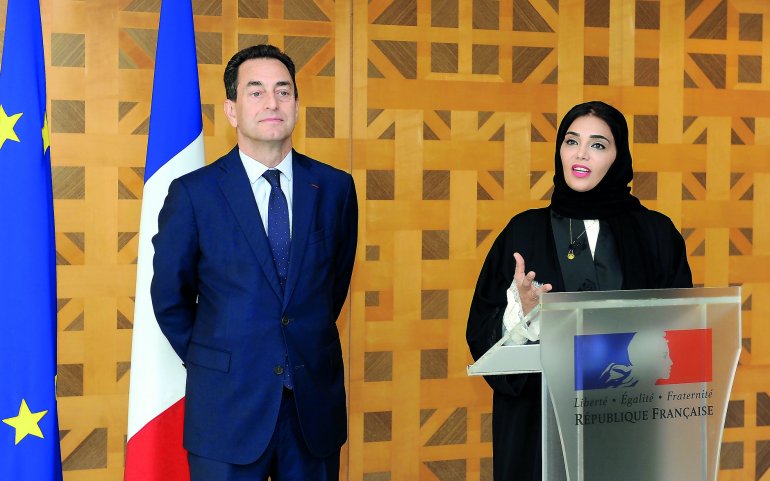High-level staff from several of Qatar’s European embassies graced the Euro…

Dr. Amal Mohammed Al-Malki was appointed as the Founding Dean of the College of Humanities and Social Sciences at Hamad Bin Khalifa University in January 2016. Prior to that, she served as the Executive Director of the Translation and Interpreting Institute, which she founded in 2012. She was also a Professor at Carnegie Mellon University in Qatar, from 2005-2016, where she taught courses in writing composition, postcolonial literature, theories of translation, and Islamic feminism. Dr. Al-Malki holds a PhD in Comparative Literature from the University of London-SOAS, where she also earned a master’s degree in English-Arabic Applied Linguistics and Translation.
Dr. Al-Malki is a woman who proudly acknowledges her multiple identities, being a mother, a Qatari citizen, a hybrid, a Muslim, an Arab, a professor, and a feminist. Her academic journey and career began at a young age, where she started her undergraduate studies at Qatar University at the age of sixteen. Following graduating with a bachelor’s degree in English and Education, she immediately went to London in pursuit of postgraduate studies. She earned an MA in English/Arabic Applied Linguistics and Translation, and a PhD in Comparative Literature focusing on Post-colonial novels. She usually reminisces on her years as a student and researcher in SOAS and expresses her gratitude for living in a cosmopolitan city like London, where cultures and languages meet, interact, and usually create a hybrid culture with which one can identify with. She is specifically grateful for all the experiences that were available to her as a young researcher in an educational system that is known for its interdisciplinarity and width. As a researcher of postcolonial theory, she spent hundreds of hours between the library in SOAS, Senate House Library, and British Library. She immersed herself in the studies of third-world feminism, multiculturalism, and identity and identity politics, all of which became the areas of her expertise and passion. London has also ignited her passion for intercultural communication as well as many forms of arts which London is known for.
Dr. Al-Malki obtained her PhD in 2003, making her the youngest PhD holder then. She joined Carnegie Mellon University in Qatar in 2005 after spending 6 months teaching in the mother campus in Pittsburgh, a challenge that she accepted. Having the chance to be hired in one of the local universities in Qatar, Dr. Al-Malki opted to take the extra mile and to prove her ability to compete on an international level. Dr. Al-Malki became the first Qatari faculty to teach at Education City at large, and the only one until more Qatari faculty joined Texas A&M University at Qatar and Hamad bin Khalifa University eleven years later.
Her passion and commitment to education led Dr. Al-Malki to the establishment of the Translation and Interpreting Institute (TII) at Hamad Bin Khalifa University (HBKU) in 2012. Today, TII delivers two unique master’s programs in Translation and Audio-visual Translation; in addition to a renowned Language center that promotes multiculturalism through a collage of language programs for adults and children; and a Translation and Training center that offers quality translation and interpreting services and professional development training.
Dr. Al-Malki’s success within TII led to her current deanship position and the establishment of HBKU’s College of Humanities and Social Science (CHSS). This position allowed Dr. Al-Malki to contribute towards shaping higher education in Qatar. Therefore, the College’s programs are geared towards social impact and were developed to be relevant and address local challenges. The College’s research agenda focuses on areas of importance such as diversity, inclusion and accessibility, and gender equality and empowerment. Today, the College offers three unique programs: PhD in Humanities and Social Sciences, a Master of Arts in Women, Society and Development, and a Master of Arts in Digital Humanities and Societies. Through these programs, Dr. Al-Malki is confident that younger generations will be able to drive positive changes within their own societies.
Dr. Al-Malki’s research interests include the negotiation of identity between East and West, media representations of Arab women, and postcolonial literature. She has published numerous articles in academic journals in the United States and the UK. Her book, Arab Women in Arab News: Old Stereotypes and New Media (2012) is published by Bloomsbury Qatar Foundation and Bloomsbury Academic, UK. It was lauded as the first comprehensive study of the topic in the world. She also edited The Writer’s Craft: Teaching Creative Writing in Qatar, published as a part of Doha–the Arab Capital of Culture festival in 2010.
Dr. Al-Malki has been invited to speak at conferences and forums throughout the Middle East, United States, and the UK. She was the first Arab and Muslim Keynote Speaker at City University in New York after 9/11. She was also the first Qatari to be invited to speak at the Cheltenham Literature Festival. She has lectured at Durham University, SOAS, and Maryland University among others. Focusing on women’s rights and Arab identity, she was recognized as a Qatar Foundation achiever in 2010 and has been profiled in several local and international magazines. She was an honoured guest at the first Middle Eastern meeting of the Active Leaders for Women’s Advancement in the Near East (ALWANE) Coalition, an initiative by Women’s Campaign International (WCI), which advocates for gender equality around the world. She was also selected to take part in several prestigious and exclusive programs, such as the Future Leader Program in 2014 in France by the French Ministry of Foreign Affairs, and Georgetown’s Leadership Seminar in Washington, D.C.
Dr. Al-Malki is a sought-after public speaker and social commentator. She strives to help deepen the international understanding of Qatar and its evolving place in the world. Dr. Al-Malki’s work aims towards deconstructing the outdated discourses about Arab women, and therefore reconstructing the physical and virtual spaces to include women and embrace women’s experiences and contributions. She dedicates her academic and research agendas to researching and writing about women’s spaces and voices, and building experiences (social or academic), and making them available to women, as the optimal route toward women empowerment. She writes and lectures about diversity and equity in higher education—an area she is deeply passionate about.
Dr. Al-Malki is a woman who proudly acknowledges her multiple identities, being a mother, a Qatari citizen, a hybrid, a Muslim, an Arab, a professor, and a feminist. Her academic journey and career began at a young age, where she started her undergraduate studies at Qatar University at the age of sixteen. Following graduating with a bachelor’s degree in English and Education, she immediately went to London in pursuit of postgraduate studies. She earned an MA in English/Arabic Applied Linguistics and Translation, and a PhD in Comparative Literature focusing on Post-colonial novels. She usually reminisces on her years as a student and researcher in SOAS and expresses her gratitude for living in a cosmopolitan city like London, where cultures and languages meet, interact, and usually create a hybrid culture with which one can identify with. She is specifically grateful for all the experiences that were available to her as a young researcher in an educational system that is known for its interdisciplinarity and width. As a researcher of postcolonial theory, she spent hundreds of hours between the library in SOAS, Senate House Library, and British Library. She immersed herself in the studies of third-world feminism, multiculturalism, and identity and identity politics, all of which became the areas of her expertise and passion. London has also ignited her passion for intercultural communication as well as many forms of arts which London is known for.
Dr. Al-Malki obtained her PhD in 2003, making her the youngest PhD holder then. She joined Carnegie Mellon University in Qatar in 2005 after spending 6 months teaching in the mother campus in Pittsburgh, a challenge that she accepted. Having the chance to be hired in one of the local universities in Qatar, Dr. Al-Malki opted to take the extra mile and to prove her ability to compete on an international level. Dr. Al-Malki became the first Qatari faculty to teach at Education City at large, and the only one until more Qatari faculty joined Texas A&M University at Qatar and Hamad bin Khalifa University eleven years later.
Her passion and commitment to education led Dr. Al-Malki to the establishment of the Translation and Interpreting Institute (TII) at Hamad Bin Khalifa University (HBKU) in 2012. Today, TII delivers two unique master’s programs in Translation and Audio-visual Translation; in addition to a renowned Language center that promotes multiculturalism through a collage of language programs for adults and children; and a Translation and Training center that offers quality translation and interpreting services and professional development training.
Dr. Al-Malki’s success within TII led to her current deanship position and the establishment of HBKU’s College of Humanities and Social Science (CHSS). This position allowed Dr. Al-Malki to contribute towards shaping higher education in Qatar. Therefore, the College’s programs are geared towards social impact and were developed to be relevant and address local challenges. The College’s research agenda focuses on areas of importance such as diversity, inclusion and accessibility, and gender equality and empowerment. Today, the College offers three unique programs: PhD in Humanities and Social Sciences, a Master of Arts in Women, Society and Development, and a Master of Arts in Digital Humanities and Societies. Through these programs, Dr. Al-Malki is confident that younger generations will be able to drive positive changes within their own societies.
Dr. Al-Malki’s research interests include the negotiation of identity between East and West, media representations of Arab women, and postcolonial literature. She has published numerous articles in academic journals in the United States and the UK. Her book, Arab Women in Arab News: Old Stereotypes and New Media (2012) is published by Bloomsbury Qatar Foundation and Bloomsbury Academic, UK. It was lauded as the first comprehensive study of the topic in the world. She also edited The Writer’s Craft: Teaching Creative Writing in Qatar, published as a part of Doha–the Arab Capital of Culture festival in 2010.
Dr. Al-Malki has been invited to speak at conferences and forums throughout the Middle East, United States, and the UK. She was the first Arab and Muslim Keynote Speaker at City University in New York after 9/11. She was also the first Qatari to be invited to speak at the Cheltenham Literature Festival. She has lectured at Durham University, SOAS, and Maryland University among others. Focusing on women’s rights and Arab identity, she was recognized as a Qatar Foundation achiever in 2010 and has been profiled in several local and international magazines. She was an honoured guest at the first Middle Eastern meeting of the Active Leaders for Women’s Advancement in the Near East (ALWANE) Coalition, an initiative by Women’s Campaign International (WCI), which advocates for gender equality around the world. She was also selected to take part in several prestigious and exclusive programs, such as the Future Leader Program in 2014 in France by the French Ministry of Foreign Affairs, and Georgetown’s Leadership Seminar in Washington, D.C.
Dr. Al-Malki is a sought-after public speaker and social commentator. She strives to help deepen the international understanding of Qatar and its evolving place in the world. Dr. Al-Malki’s work aims towards deconstructing the outdated discourses about Arab women, and therefore reconstructing the physical and virtual spaces to include women and embrace women’s experiences and contributions. She dedicates her academic and research agendas to researching and writing about women’s spaces and voices, and building experiences (social or academic), and making them available to women, as the optimal route toward women empowerment. She writes and lectures about diversity and equity in higher education—an area she is deeply passionate about.
Link to the article
You may also check
DOHA: The Qatari women have entered into business, arts, politics and many…


